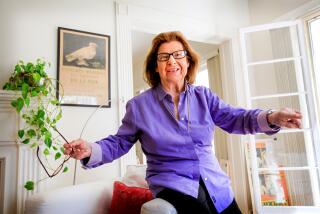Bel Kaufman dies at 103; wrote bestseller ‘Up the Down Staircase’
Bel Kaufman, who wrote the 1960s hit novel “Up the Down Staircase,” about teaching in an inner-city school, lectured widely on the topic “surviving through humor.”
Hopefully, her audiences took good notes. Kaufman, who survived violence in Russia as a child as well as other travails, was still teaching a college course at 99.
Kaufman, 103, died Friday in her apartment in New York of age-related causes, said her daughter, Thea Goldstine.
As a writer and humorist, Kaufman came upon her talents honestly — her grandfather was the much-beloved Yiddish humorist Sholem Aleichem, whose stories about Tevye the Milkman were the basis of the musical “Fiddler on the Roof.” Kaufman often told the story of Aleichem saying to her when she was a little girl that the tighter she held his hand, the better he would write.
“If you like his writings,” she told an audience in 2012, as reported in Washington Jewish Week, “you know who to thank.”
But Kaufman was also highly praised for her own writing. “Up the Down Staircase” (1965), based on her experiences teaching in New York City public schools, made use of administrative memos, student notes, letters from the principal and the like to tell the fictional story of new teacher Sylvia Barrett, who struggled to have an effect on her students’ lives while dealing with an archly bureaucratic administration and unruly classrooms.
The title came from a memo by a school official in the book who wrote that a student was being disciplined for walking up a staircase that was designated for downward travel. The book was on bestseller lists for more than a year and translated into numerous languages. It was made into a 1967 movie with Sandy Dennis as Sylvia.
Kaufman recognized that conditions in many urban schools had gotten significantly worse since she wrote the novel. Back then, she told the New York Times in 2004, “Schools were a haven from what was happening outside. Now the outside has come in.”
She was born Belle Kaufman on May 10, 1911, in Berlin, but grew up in Odessa and Kiev in what is now Ukraine. Her father was a physician and her mother a writer.
Kaufman grew up amid unrest and then revolution in Russia. “Dead bodies were frozen in peculiar positions on the street,” she recalled in a 2011 New York Times interview. “But a child has no basis for comparison. Doesn’t every child step over dead bodies? I didn’t know any different.”
Arriving in the United States in 1923, Kaufman was plunged into the school system without knowing English. But she quickly advanced and in 1934 graduated magna cum laude from Hunter College. She went on to get a master’s degree from Columbia University but was turned down for a teaching job in the public schools because she still had traces of a Russian accent.
After several tries, she got over that hurdle, only to be rejected because of an interpretation she gave of a poem by Edna St. Vincent Millay. Not one to give up easily, Kaufman wrote directly to Millay, asking about her interpretation. The poet heartily approved of what Kaufman had written, and the school officials backed down and offered her a job.
Before writing her book, she wrote short stories and articles that she submitted for publication under the shortened, somewhat more androgynous name Bel because female writers faced barriers.
After the success of “Up the Down Staircase,” she wrote only one more novel: “Love, Etc.” Published in 1979, it also had roots in the author’s real life, but this time the main character was dealing, as Kaufman had, with middle-age divorce.
Reviewing the book in the Los Angeles Times, Anne Wittels wrote that “Kaufman is an excellent writer, witty and perceptive.” But like some other reviewers, Wittels felt the book’s novel-within-a-novel structure was overly complicated.
Kaufman continued to teach on occasion, and she became a popular public speaker. At 99, she taught a course at Hunter on Jewish humor. Her last public speaking appearance was in May at an annual remembrance of her grandfather, Goldstine said. Aleichem died in 1916 when his granddaughter was 5.
“I’m very glad to be so old, and I’ll tell you why,” Kaufman told an audience in 2010, according to the New York Times. “Because I’m the only one alive who knew Sholem Aleichem.”
Besides her daughter, who lives in Sebastopol, Calif., Kaufman is survived by her second husband, Sidney Gluck; son Jonathan Goldstine of State College, Penn.; brother Sherwin Kaufman of New York; and a granddaughter.
Twitter: @davidcolker
More to Read
Start your day right
Sign up for Essential California for the L.A. Times biggest news, features and recommendations in your inbox six days a week.
You may occasionally receive promotional content from the Los Angeles Times.







